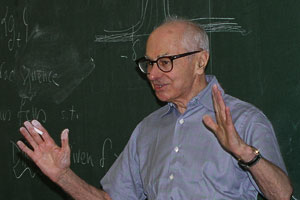Serge Lang facts for kids
Quick facts for kids
Serge Lang
|
|
|---|---|

Serge Lang (1927–2005)
|
|
| Born | May 19, 1927 Paris, France
|
| Died | September 12, 2005 (aged 78) |
| Citizenship | French American |
| Education | California Institute of Technology (BA) Princeton University (PhD) |
| Known for | Work in number theory |
| Awards | Leroy P. Steele Prize (1999) Cole Prize (1960) |
| Scientific career | |
| Fields | Mathematics |
| Institutions | University of Chicago Columbia University Yale University |
| Thesis | On Quasi Algebraic Closure (1951) |
| Doctoral advisor | Emil Artin |
| Doctoral students | Minhyong Kim Stephen Schanuel |
Serge Lang (French: [lɑ̃ɡ]; May 19, 1927 – September 12, 2005) was a famous French American mathematician. He taught at Yale University for most of his career. Lang was well-known for his work in number theory, which is a branch of mathematics. He also wrote many important mathematics textbooks, including a very famous one called Algebra.
Besides his math work, Serge Lang was also an activist. He spoke out against the Vietnam War. He also successfully stopped a political scientist named Samuel P. Huntington from joining a special group called the National Academy of Sciences. Later in his life, Lang held strong, sometimes controversial, views on certain scientific and social issues.
Contents
Early Life and Education
Serge Lang was born in Saint-Germain-en-Laye, near Paris, France, in 1927. He had a twin brother who became a basketball coach. His sister became an actress. When he was a teenager, Lang and his family moved to California.
He finished high school in 1943 at Beverly Hills High School. After that, he earned a bachelor's degree from the California Institute of Technology in 1946. He then went on to get his PhD in mathematics from Princeton University in 1951.
A Career in Mathematics
After finishing his studies, Lang taught at several universities. These included the University of Chicago and Columbia University. He later joined Yale University, where he spent most of his teaching career.
Lang's main work was in number theory. This field studies whole numbers and their properties. He also worked on diophantine geometry, which combines number theory and geometry. He made several important guesses, called conjectures, in this area. These include the Mordell–Lang conjecture and the Bombieri–Lang conjecture.
Lang was also part of the Bourbaki group. This was a group of mostly French mathematicians who wrote many books on modern mathematics.
Writing Math Books
Serge Lang wrote a lot of math books. He often wrote a new book during his summer breaks. Most of his books were for university students studying advanced math.
His book Algebra was especially important. It taught abstract algebra to graduate students. This book changed how algebra was taught in universities. Many later algebra books were influenced by it.
In 1999, he won the Leroy P. Steele Prize for Mathematical Exposition. This award recognized his skill in explaining complex math ideas clearly. The award said his Algebra book "changed the way graduate algebra is taught."
Teaching Style and Awards
Lang was known for being very involved with his students. He was a passionate teacher. Some people remember him throwing chalk if he thought students were not paying attention. One colleague said he would shout in class to achieve "truth and clarity."
In 1960, Lang won the Frank Nelson Cole Prize in Algebra. He received this award for his paper on "Unramified class field theory over function fields in several variables." This showed how important his research was.
Activism and Strong Views
Serge Lang spent a lot of his time on political activism. He was a strong supporter of Socialism. He was very active in opposing the Vietnam War. He even left his job at Columbia University in 1971 to protest how the university treated anti-war students.
Lang also challenged people he thought were spreading wrong information. He believed some people misused science or math for their own purposes. For example, he criticized a survey sent to college professors. He said it had unfair questions.
In 1986, Lang strongly opposed Samuel P. Huntington joining the National Academy of Sciences. Lang called Huntington's research "pseudoscience." He argued that it looked scientific but lacked real proof. Because of Lang's efforts, Huntington was not allowed to join the Academy.
Lang kept many detailed "files" of his political letters and documents. He would send letters, get responses, and then collect everything. He would then share these files with other mathematicians. Some of these files were published in his books, like Challenges.
List of Books
Serge Lang wrote many books. Here are some of his well-known works:
Books for Younger Students
- A First Course in Calculus (1964)
- Introduction to Linear Algebra (1970)
- Calculus of Several Variables (1973)
- Basic Mathematics (1971)
- Geometry: A High School Course (1988)
- Undergraduate Analysis (1983)
- Complex Analysis (1977)
- Undergraduate Algebra (1990)
Advanced Mathematics Books
- Introduction to Transcendental Numbers (1966)
- Introduction to Algebraic Geometry (1959)
- Elliptic Curves: Diophantine Analysis (1978)
- Modular Units (1981)
- Abelian Varieties (1959)
- Fundamentals of Diophantine Geometry (1983)
- Algebraic Number Theory (1970)
- Introduction to Modular Forms (1976)
- Fundamentals of Differential Geometry (1999)
- Algebra (1965, revised 2002)
Other Books
- The File: Case Study in Correction (1977–1979) (1981)
- The Beauty of Doing Mathematics (1985)
- Math!: Encounters with High School Students (1985)
- Challenges (1998)
- Math Talks for Undergraduates (1999)
See also
 In Spanish: Serge Lang para niños
In Spanish: Serge Lang para niños
 | Precious Adams |
 | Lauren Anderson |
 | Janet Collins |

